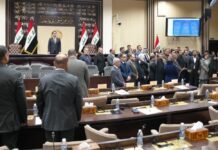Iraq’s Respectability Bonus called for smoothing out pointless systems while visiting property enlistment workplaces. A study estimating pay off insights uncovered that 63% of commentators expressed that the longing for speedy exchange handling was the essential justification behind offering incentives.
The Commission suggested fortifying the observing job of the Service of Equity’s administrative bodies to manage worker execution. Overview brings about the property enrollment area showed that 42% of the people who offered pay-offs detailed that the incentive was given straightforwardly from the commentator to the pertinent worker. It noticed that beginning the digitization of property exchange techniques could end the standard dissatisfactions looked by analysts and fundamentally help in forestalling and decreasing debasement.
The Commission’s Office for Relations with Non-Legislative Associations revealed, in a report shipped off the State leader’s Office, the Secretary-General of the Board of Clergymen, and the Pastor of Equity, that as a feature of the Commission’s obligation to forestall and battle debasement through logical and proficient estimation of defilement markers, it led field visits through its focal group and supporting groups, as well as groups laid out in directorates and examination workplaces in Baghdad and different territories. North of 90 days, the Commission visited 57 property enrollment workplaces, looking over the assessments of 7,225 analysts. Results demonstrated that the pay off rate across property enlistment workplaces in Iraq came to 24%.
Overview examination brings about Baghdad and the regions showed that subsequent to leading 99 visits to 17 workplaces in Baghdad, the overall pay off rate (discernment) came to 27.7%. Albeit this rate is lower than what was kept in the 2021 overview, it is as yet viewed as high. Karkh Second Property Office recorded the most noteworthy pay off rate at 40.4%, trailed by Adhamiyah at 31.8%, and Kadhimiyah First at 31.7%. In the mean time, the property enrollment workplaces in Shaab, Kadhimiyah Second, and Rusafa Previously recorded the least pay off rates at 18.4%, 19.2%, and 23%, separately. The study uncovered a slight decrease in pay off rates in three workplaces in Baghdad contrasted with past levels.
In the territories, 40 workplaces were visited. Al-Qasim Property Office in Babel Region positioned first with the most noteworthy pay off rate at 47.5%, trailed by Karbala First at 39.7%, and Abu Al-Khasib in Basra at 38.1%. In the mean time, Shatra Property Office in Dhi Qar Area recorded the most reduced pay off rate at 1%, trailed by Al-Khader in Muthanna Region and Souq Al-Shuyoukh in Dhi Qar at 2.7% and 2.9%, separately.
The report noticed that the most elevated postpone in handling exchanges was recorded at the Overall Property Enlistment Directorate, at 50.8%. 61% of analysts refered to routine postponements as the justification behind handling delays, while 38.6% credited the deferrals to deficient management. In the interim, 19.4% refered to the explanation as the need to offer incentives.
The report demonstrated that the ongoing study results, alongside past overviews from 2018 and 2021, showed the continuous commonness of pay off in this area’s workplaces at high rates, notwithstanding slight enhancements. This keeps on sabotaging public confidence in the area’s workplaces and highlights the need to dispense with administration that establishes a climate helpful for double-dealing and coercion by deceitful representatives. The group found no huge changes in work techniques contrasted with those continued in earlier years.
The report likewise distinguished regular instances of missing property possession records or portions of them, which places residents confronting such issues in a pattern of long survey cycles to sort out another document or make up for lacking pieces. Also, the Property Enrollment Directorate was delayed to make a quick move to resolve issues in office work. Additionally, need was given to merchants and specialists who were predominant in the workplaces, going about as delegates among analysts and representatives.





